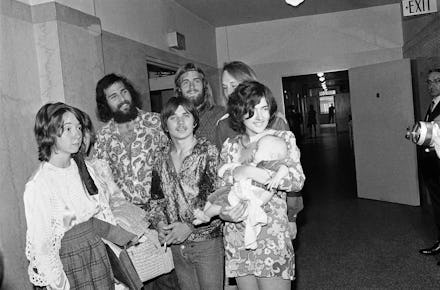Emma Cline's 'The Girls' Looks at the Charles Manson Murders From a Feminist Perspective

I've had a renewed and fixated interest in the Charles Manson murders since Jeff Guinn's excellent biography of the cult leader. Emma Cline's debut novel is a fictionalization of the Manson killings, which remain a huge American anxiety, from a refreshingly human angle. The Girls centers on Evie, a 14-year-old falling through the cracks of her parents' divorce who fills that void by falling in with a Manson-like leader and his cult during the summer of 1969.
During the summer of 2015, I devoured Karina Longworth's multi-episode dive into the world of Manson on her podcast You Must Remember This. It was one of the first times I've seen the events leading up to the summer of 1969 handled with emphasis put upon the lives of Manson's female followers and victims. For example, Longworth devotes two entire haunting episodes to the life of Manson victim Sharon Tate, a woman often reduced to an actress who happened to be Roman Polanski's wife.
In the same vein, Cline's handling of the Manson mythology takes a distinctly feminist point of view. As opposed to other significant Manson-centric works I've read, Cline leans away from the cult leader and into the space of his female followers, the titular "girls" are given insight not often afforded to the women who ended up committing those infamous and violent acts in Manson's name.
Cline gives fresh insight into the interior life of Evie, whose middle-aged reflections on that summer have both the immediacy of impressionable youth and a hazy recalling of a dream. While still being wholly accessible as an account of girlhood and coming of age, the novel dips us back into a moment in history were the space that the titular "girls" fall into is a trap conditioned by society, one that the Manson stand-in and cult leader Russell waits in eagerly.
In exploring the way that these young women end up at a rundown ranch and in the orbit of charismatic hack, Cline adds a narrative layer that is often missed in discussing the Manson murders. Evie offers another look at that electric summer and a time where "free love" was a veil for the exploration of women, which Cline skillfully cuts through.
At the novel's center is the relationship between Evie and Suzanne, one of the followers who draws the former to the cult with magnetism that is at times otherworldly and undeniably human. It deftly explores dynamics of being young and being drawn to someone just a bit older, someone who offers the promise to fill patches left unfinished in another. Suzanne's real life counterpart, Susan "Sadie" Atkins, is commonly referred to (or dismissed) as an unhinged fanatic and deadly sexpot, but as Evie's fascination with her builds through the novel we learn more about this woman through the push and pull of an adolescent obsession.
Then, of course, there are the fabled crimes, which are themselves a specifically American nightmare. Through Evie, the reader gets the experience of being on the fringe of something equally horrific and famed: They are touched by the events of that summer, and The Girls offers an insightful proximity to it.
There's something about the Manson murders that still hangs in the air like summer heat, and in addition to a refreshingly nuanced lens to view the event from The Girls doesn't lose any bit of the dark magic that draws readers to this moment in history.
Read more: